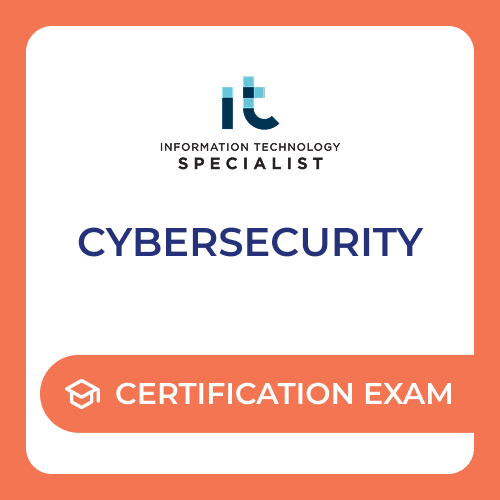IT Specialist Cybersecurity - Certification Exam Voucher
IT Specialist Cybersecurity - Certification Exam Voucher
Couldn't load pickup availability
Overview of IT Specialist Cybersecurity Certification
Candidates for this certification have a foundational knowledge of the procedures used to secure networks, devices, and data, as well as an understanding of the issues surrounding governance, transparency, security, and ethics in cybersecurity. Successful candidates will be able to analyze and classify threats and vulnerabilities. They should be able to demonstrate knowledge of access management, encryption, risk assessment, and incident response strategies.
About this ITS Cybersecurity Certification Exam
The ITS Cybersecurity Certification assesses your ability to apply core security principles, identify and mitigate threats, secure networks and endpoint devices, and respond to incidents. Candidates should understand how to monitor systems, manage access, and ensure compliance with privacy and security standards.
Why gain Certification?
Those who take and pass ITS certifications are empowered to stand out in the competitive job market, while simplifying daily tasks, boosting productivity and fostering career growth.
Useful Information
- ITS Cybersecurity Exam is 50 minutes
- ITS Cybersecurity Exam has 40–50 questions
Topics the exam tests you on
Security Principles
- Explain common security principles
- Explain cybersecurity frameworks and industry-accepted best practices
- Explain vulnerabilities, threats, and common attacks
- Recognize social engineering attacks
- Explain access management principles and procedures
- Explain how encryption protects the confidentiality and integrity of data
Securing the Network
- Identify vulnerabilities associated with commonly used protocols
- Describe the role of addressing in network security
- Describe the purpose and function of network security technologies
- Validate the security of wireless networks
- Examine network security logs to identify anomalies
Securing Endpoint Devices
- Apply security settings to harden operating systems
- Use endpoint tools to gather security assessment information
- Use packet capture utilities to identify anomalies
- Demonstrate familiarity with endpoint security policies and standards
- Interpret system logs to identify anomalies
- Perform malware removal
Vulnerability Assessment and Risk Management
- Use threat intelligence sources to identify potential network vulnerabilities
- Explain risk management
- Explain the penetration testing process
Incident Handling
- Monitor security events to determine if escalation is required
- Explain the digital forensics process and attack frameworks
- Explain the elements of cybersecurity incident response
- Explain the importance of disaster recovery and business continuity planning
- Assist users in restoring data after an incident
Additional Information
- Find Objective Domains here: IT Specialist Cybersecurity
- Exam tutorial here: IT Specialist exam tutorial


